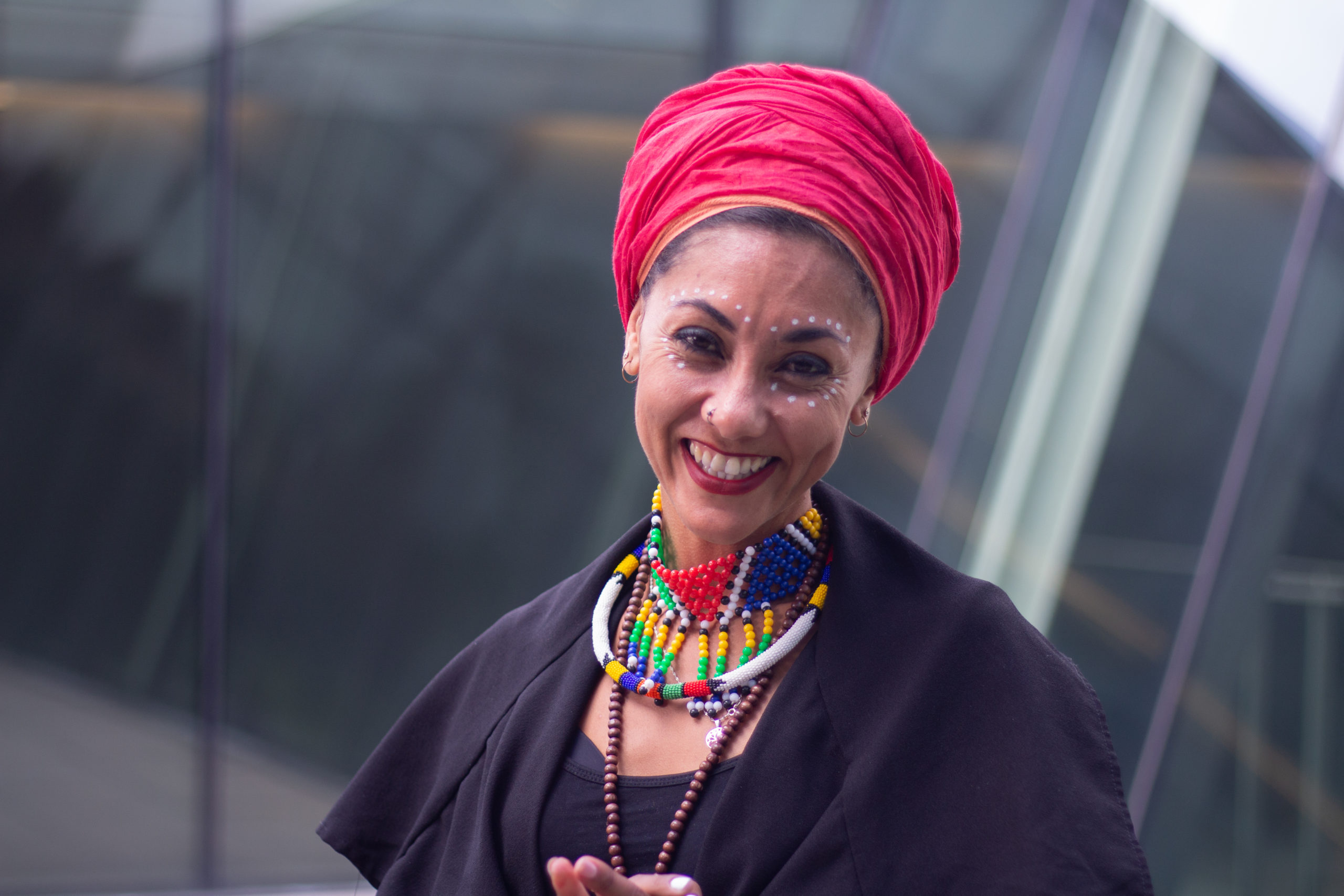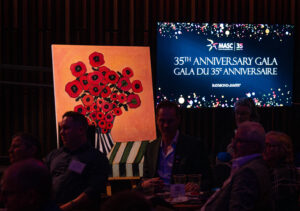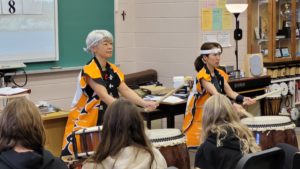Interview: Storyteller, actor and educator Jacqui Du Toit
By Jessica Ruano | December 3, 2021

This interview was originally published on Apt613.ca
Born and raised in South Africa, Jacqui Du Toit is known for her animated stories from her motherland. By combining gestures, movement, singing, facial expressions, and dramatic impersonations that spark the audience, Jacqui knows how to captivate with more than just words. Here, Jacqui talks about creating opportunities for performers of colour in Ottawa’s theatre scene and providing a safe space for vulnerability in young storytellers.
Jacqui Du Toit at the Awesome Arts Festival. Photo provided by MASC.
MASC: The Origin Arts & Community Centre, the only Black-owned performing arts venue in Ottawa, is perhaps the most exciting thing to happen to Mechanicsville and the Ottawa arts scene in recent years. Could you tell us a bit about the origin of The Origin?
Jacqui Du Toit: The Origin Arts & Community Centre started with a longing, a vision, a tiny seed of “what if.” What if we could create a space for artists to feel a home away from home? To feel welcomed. Wanted. Appreciated. Nurtured. To express. Create. Connect. Collaborate.
For all three co-owners, in our own way, we felt the same. For me personally, I felt a deep longing for the arts scene in Cape Town, South Africa, where I lived before moving to Ottawa. I felt the longing for the diversity, the colours, but especially the vibrancy.
Jacqui Du Toit and participants at a 2019 storytelling workshop in Sandy Hill. Photo provided by MASC.
One day while taking my daughter for a walk I noticed the sweet smell of freshly roasted coffee beans, and it was coming from a garage. I went over to investigate and met Pierre Richard. That space was the birth home of Happy Goat Coffee Company. And I found myself hanging out there, sipping on delicious coffee, connecting with neighbours, sharing stories, and visualizing that space as a creative space for artists to come together.
However the space changed ownership and I thought the dream was lost with it. Two years went by, and one day while I was walking past the garage, the new owner told me the space was available again and I jumped on the chance to make my dreams a reality.
“I have witnessed an increase in examples of collaborations, creations, connections between cultures, heritages, and experiences, and being proud of your culture and heritage and not being afraid to share it.”
Around that same time, Jamaal Jackson Rogers contacted me and asked if I wanted to be in a video for his new cinepoem. We met up, shared our ideas, and found we were both longing for a place to do creative projects. So I showed him the space. And that evening, he brought his brother Ali (Captain) and we co-signed. And the rest is history.
Your recent interview in the Ottawa Citizen talked about the challenges you faced breaking into the cliquey Ottawa theatre scene as a woman of colour. Has the local scene at all changed since then?
In some ways, yes, and in other ways, no. Yes, we are finally beginning to see a slight shift in the local scene! Sometimes I wonder why it took so long, however I am grateful for where we are now; there is movement and there are shifts. The more we talk about it, the more people are aware of it. I have witnessed an increase in examples of collaborations, creations, connections between cultures, heritages, and experiences, and being proud of your culture and heritage and not being afraid to share it. However, there is still a lot more that we can do to create even more of these opportunities and to pave the way for the future.
Jacqui Du Toit and participants at a 2019 storytelling workshop in Lowertown. Photo provided by MASC.
What advice would you give to other young performers of colour looking to make it as performing artists?
I would say, see each workshop/gig/performance as a stepping stone to where you want to be, and each experience as part of the journey. The idea of “making it” in my perspective is not the main purpose for which you should choose to follow this path as a performing artist. You do it because there is a deep passion that lives inside of you. Stay focused on your vision.
As a member of MASC, what do you gain through offering your workshops in schools and in the community?
As a member of MASC, I find it very rewarding to have the opportunity to work with the community and youth. I feel well-supported by the network of MASC members that consists of administrative staff and incredibly talented and inspirational artists throughout the city. Meeting artists from various disciplines and creating stronger relationships between us has helped me to grow as an artist and youth educator.
Jacqui Du Toit at a storytelling workshop. Photo provided by MASC.
You’ve done amazing work with children and youth, inspiring them to tell their own stories, often about very difficult subjects. How do you work with them to attain the level of vulnerability required for sharing such personal stories?
I created a method that is based on various teachings I have experienced with my elders and throughout my creative work process and practice. Over the years I have come to learn and understand that each and every one of us carries stories within us. Sometimes those stories can hold us back from going where we need to go, from moving forward; however, most of the time these stories just need to be heard. The true art of storytelling is in the listening. Truly listening. Not just with our ears, but with our hearts, spirits, and minds.
Latest News
View All Articles



